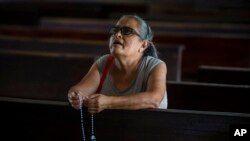Nicaraguan police Friday raided the residence of a Roman Catholic bishop critical of President Daniel Ortega's regime and detained him and several other priests. Tensions between churches and governments have increased dramatically, and they have become increasingly intolerant of dissent.
The predawn raid took place after Nicaraguan authorities accused Matagalpa Bishop Rolando Alvarez of "organizing violent groups" and inciting "to carry out acts of hatred against the population." was broken.
President Daniel Ortega's government has systematically opposed dissent voices, with dozens last year including seven of his candidates likely to challenge him in the presidential race. of opposition leaders were arrested. They were sentenced to prison earlier this year in a speedy trial closed to the public.
Ortega's Sandinista National Liberation Front-controlled Congress has ordered the closure of more than 1,000 of his non-governmental organizations, including Mother His Teresa's Charity.
Early Friday morning, Matagalpa Diocese posted on social media, "#SOS #Urgente. National Police now enter the Anglican rectory in Matagalpa Diocese."
The National Police confirmed the detention in a subsequent statement, saying the operation was undertaken to allow "the citizens and families of Matagalpa to return to normalcy."
"For several days a positive communication from the Diocese of Matagalpa was awaited with much patience, prudence and responsibility, but it never materialized," the statement said. "The aforementioned security operations became necessary as destabilization and provocation continued."
No specific charges were mentioned.

Alvarez was under his surveillance at his home in Managua. There he was allowed to meet with his relatives and Leopold his Cardinal Brennes. A police statement said.
Other people taken with Alvarez — police did not identify how many — are still being processed, police said.
The Inter-American Commission on Human Rights condemned the detention and called for the immediate release of those detained.
Alvarez has been a key religious voice in the debate over Nicaragua's future since 2018, when a wave of protests against the Ortega government led to a crackdown on dissent.
41} "I hope there will be a series of electoral reforms, structural reforms of electoral authorities, free, fair and transparent elections, unconditional international surveillance," Alvarez said after the protests erupted. Told me a month later. "Effectively democratize the country."At the time, a priest from Alvarez Parish had been injured in his arm by shrapnel while trying to separate protesters and police in Matagalpa.
Alvarez has continued such calls for democracy over the past four years, infuriating Ortega and First Lady and Vice President Rosario Murillo.
Manuel Orozco, a Nicaraguan expert on the Inter-American Dialogue in Washington, said Alvarez posed an obstacle and a symbolic threat to Ortega.
"Nicaraguans are very loyal to the church," he said. “In a survey I conducted last year, 70% of Nicaraguans said the political views of religious authorities at the national or parish level were important in shaping their political views.”
"[Alvarez's] story is based on a religious script, a biblical script, about opposing oppressors," Orozco said. "And although he implies that he will not incite violence or call for resistance, he says there will be repression."
He said he was betting on not getting a "decent response" from the international community. "And they continue to push the envelope because they think of nothing but military aggression. Nothing will be able to stop them." , following weeks of escalating tensions between the church and the Ortega government, which has had a complicated relationship with Nicaragua's dominant religion and its leaders for more than 40 years.
Former Marxist guerrillas raged at the Vatican in the 1980s, but gradually allied themselves with the Church in 2007 as they moved to regain the presidency after a long absence from power. built a relationship. Now he seems to see political gain in direct confrontation again.
Ortega initially asked the church to mediate talks with protesters in 2018, but has since taken a more active stance.
In March, Nicaragua expelled the Vatican's top diplomat, Nicaragua's papal envoy.
His August 5 announcement that Alvarez was under investigation came hours after Murillo criticized him for "crimes against spirituality" and "expressions of hatred", apparently referring to Alvarez. It was conducted.
The Vatican remained silent on the Alvarez investigation for nearly two weeks, drawing criticism from Latin American human rights activists and intellectuals. That silence was broken when observer Juan Antonio Cruz Monsignor expressed concern about the situation and called on both parties to "seek ways of understanding." It again did not comment and did not immediately report the news on its internal media portal. Publishing regular expressions of solidarity with the bishops of America.


